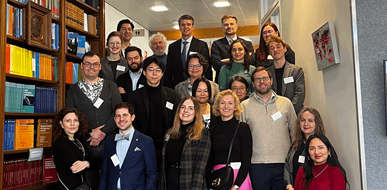Connecting historical memory governance in Latin America and East Asia
Published 12 March 2024
Participants of the MEMOCRACY workshop - It is the first time that scholars from Latin America and East Asia have come together to compare the legal governance of history.
The MEMOCRACY project is bringing scholars from Latin America and East Asia together to the Hague, to explore new solutions to legal governance of history through ‘memory laws’ – laws that regulate historical memory. These laws can be punitive, with a criminal punishment for denialism of historical fact, and non-punitive, usually declarative or commemorative. It is the first time that scholars from these two regions have come together to compare the legal governance of history and the addition of these unique regional perspectives complements the research of the project case studies on Baltic States, Germany, Hungary and Poland, Russia, and Ukraine.
‘Memory laws in the two regions are often very different from those Europe. This unique connection gives us an opportunity to stimulate the new ways for cooperation and research amongst the scholars in this field in East Asia, Europe and Latin America,’ explains Dr. Uladzislau Belavusau, Senior Researcher in the Asser Institute and the Head of the Dutch team of the MEMOCRACY consortium.
National narrative versus critical self-reflection
Abuses of memory laws and policies can undermine European values such as democracy, fundamental human rights and the rule of law. In some cases, laws governing historical memory have played a key role in building, or re-building of a sovereign state. However, as memory laws often punish certain historical perceptions, they can challenge the efforts of public debate and the ability to reflect critically on the past. In particular, in Central and Eastern Europe they can also facilitate authoritarianism. As the country studies of the MEMOCRACY Project have shown, legal bans on historical speech have been proliferating in Central and Eastern Europe since 2010s. Achieving a balance with freedom of speech and human rights can be a challenge. But that problem is not exclusively regional. For example, the Federal Constitutional Court in Germany had to rule on the constitutionality of the Holocaust denial ban, highlighting that the law governing freedom of expression does not grant protection to factual assertions proven and known by the speaker to be incorrect.
A global phenomenon
Most of the scholarship on memory laws so far has been rather Euro-centric, which overlooks significant developments elsewhere. With this workshop, the MEMOCRACY Project opens novel academic horizons beyond the geographic scope of Europe, where this phenomenon has been relatively well-studied. Instead, legal scholars, experts from social sciences and practitioners from Latin America and East Asia are meeting to discuss the diverse ways these regions have been dealing with memory laws and memory policies. They will analyse if better answers to historical challenges have been offered in the legal settings beyond Europe.
Read more
Rule of law and constitutionalisation of memory politics in Hungary and Russia
In this book chapter, Ulad Belavusau focuses on the rise of memory laws in Hungary and Russia throughout the 2010s. Read more.
[Interview] Andrii Nekoliak: “The politics of memory laws can be intense”
In this interview Andrii Nekoliak explains what memory laws are and elaborates on his research on legal issues that arise from memory laws, with a particular focus on Ukraine and Russia.
The MEMOCRACY research consortium studies the proliferation of the nation-centric governance of memory through laws and policies in Germany and selected countries of Central and Eastern Europe (CEE). The study unpacks the relationship of this memory governance with rising populism and the erosion of fundamental democratic rights in the region. The current workshop is the result of earlier exchanges with East Asian researchers in Tokyo and Seoul, as well as with Latin American researchers in Brazil, culminating in the unique connection of the workshop organised in The Hague.
